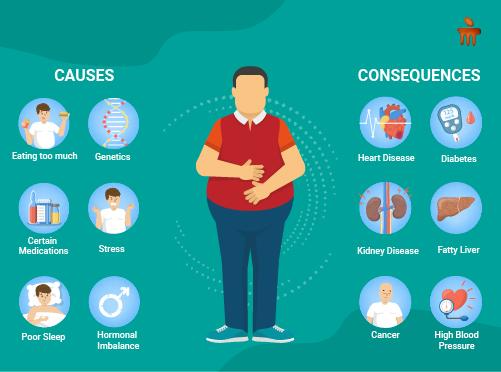
Obesity is an abnormal condition in any individual that occurs due to excessive fat accumulation causing health risks to the individual. In general, obesity refers to an increase in weight which varies with the normal weight of the individual.
According to estimates, about 2.3 billion children and adults worldwide suffer from overweight or obesity. By 2025, 2.7 billion adults may be overweight or obese if current trends continue.
Body mass index (BMI) is used for identifying obesity which is measured in terms of weight in kilograms divided by height in metres squared. An overweight BMI for the individual is between 25.0 and 29.9 kg/m2, and a BMI of 30 kg/m2 or higher is considered obese. It is advised that a percentile scale, depending on the child's sex and age, be used instead of the BMI for children and adolescents aged 2 to 18 years.
Causes and Risk Factors Of Obesity
The major cause of the increasing obesity cases among individuals is the high-calorie intake required by the body over time. The intake of any extra energy that our body consumes results in fat accumulation, leading to obesity. Some other causes of obesity include:
-
Genetics may have an impact on how your body converts food into energy and stores fat.
-
Ageing can result in less muscle mass and a slower metabolism, making it simpler to gain weight.
-
Not getting enough sleep might cause hormonal changes that increase hunger while increasing the intake of high-calorie foods.
-
Pregnancy, as weight gained during pregnancy, could be difficult to reduce and eventually contribute to obesity.
-
Unhealthy eating patterns are practised by the person or household.
-
Absence of any physical activity.
-
Some health conditions, such as polycystic ovary syndrome (PCOS), Prader-Willi syndrome, Cushing syndrome, hypothyroidism, and osteoarthritis.
-
Use of some medications such as antidepressants, anti-seizure medications, diabetes medications, and some types of contraceptives.
The following are some major risk factors for obesity:
-
The genetics of some individuals can cause difficulty in losing weight.
-
Environment and Community
Individuals can be at increased risk of obesity if they:
-
Dwell in nearby places that do not have more options for healthy food, but rather have options for food items high in calories
-
Do not have an idea how to cook healthy meals
-
Do not have an appropriate place to walk, play or exercise in the neighbourhood
-
Psychological Factors
Some of the psychological factors found at a laparoscopic surgery hospital in Salt Lake, responsible for causing obesity, include:
-
Depression among individuals results in weight gain, as some of them prefer food to reduce their emotional breakdown. Also, some antidepressants are another factor responsible for causing weight gain.
-
Quitting smoking most often leads to gaining weight. Therefore, following appropriate exercise and diet is considered important if someone opts to quit smoking.
-
The use of some medications, such as steroids or birth control pills, leads to weight gain among individuals.

Signs and Symptoms of Obesity
Common symptoms of obesity in adults include:
-
Excess body fat, mainly around the waist
-
Shortness of breath
-
Sweating heavily than normal
-
Snoring
-
Sleeping difficulties
-
Skin-related issues are due tare o the moisture accumulated within the body folds.
-
Inability to carry out simple physical activities that one could readily do before weight gain.
-
Fatigue ranges from mild to severe.
-
Pain in the back and joints.
-
Psychological issues involving depression, social isolation and negative self-esteem.
Common symptoms of obesity in children include:
-
Deposit of fatty tissue.
-
Stretch marks on hips and back.
-
Shortness of breath with a lack of physical activity.
-
Sleep apnea
-
Constipation
-
Gastroesophageal reflux disease (GERD)
-
Low self-esteem
-
Biological girls experience early puberty, whereas biological males experience delayed puberty.
-
Orthopaedic issues such as flat feet or dislocated hips.
Complications of Obesity
According to the best laparoscopic surgeon in Kolkata, several major medical conditions can be worsened by obesity. Obesity increases the risk of developing severe health issues like:
-
Fatigue and lack of physical activity.
-
High cholesterol level increases the chances of stroke, heart attack and other complications.
-
High blood pressure may lead to heart-related issues as it enables the heart to pump blood harder.
-
Increased chances of type 2 diabetes, as it is directly associated with obesity, are being observed in almost 50% of cases.
-
The chances of occurrence of some common cancer types, which are associated with obesity, are among 40% of cases.
-
Shortness of breath may result in asthma, which may increase the chances of hospitalization and medication dependency.
-
The occurrence of kidney disease is due to higher chances of kidney damage from chronic high blood pressure.
-
Osteoarthritis may occur due to more strain within the joints, bones and muscles.
-
The chances of gall bladder disease are increasing by almost 7% as we move forward towards the BMI chart.
-
Sleep apnea may occur due to fatty deposits within the neck region and tongue that tend to block the airways.
-
The occurrence of GERD, hiatal hernia, and heartburn is due to increasing weight pressing on the valve intended to keep stomach contents out of the oesophagus.



















 5 Min Read
5 Min Read












